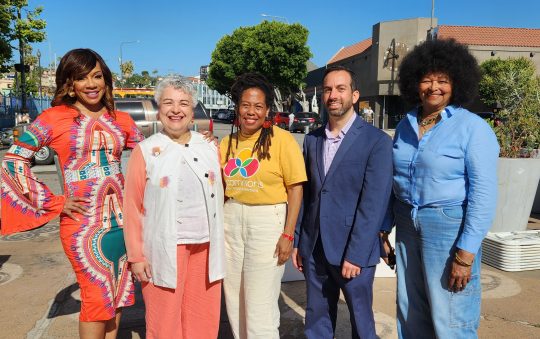
On Saturday, January 23, Holman United Methodist Church (HUMC) hosted Not in Our Backyard, an important community forum highlighting the perils of child sex trafficking and the preventative steps needed to eradicate the worldwide issue, also prevalent in South L.A. The conversation, sponsored by HUMC, the Crenshaw/Watts Rotary Club and the Coalition to Abolish Slavery Trafficking (CAST), was moderated by HUMC Senior Pastor Kelvin Sauls and featured a series of well-versed panelist, speakers and community activists in the area of trafficking.
Keynote speaker Avis Ridley-Thomas, wife of 2nd District Supervisor Mark Ridley-Thomas, kicked-off the conversation, describing her extended families’ personal experience with the widespread issue, and how the typical trafficker isn’t always so typical. Thomas said referencing a CEO, who received 10 years jail time after caught trafficking over 9 young women in Atlanta. Thomas, also the Co-Director of the Institute for Nonviolence and Days of Dialogue, continually works to empower to circumvent the re-occurrence of child sex trafficking in South L.A.
Panelists for the community forum included Jane Creighton, Deputy District Attorney for Los Angeles County, Sergeant Jeffery Walker, 26-year L.A. County Sheriff Department veteran, Gabriella Lewis, Supervising Case Manager for CAST, and Rev. Deborah Manns, an ordained minister and Founder of The Virtuous Woman Ministries Inc.
Creighton, who has been assigned to the Sex Crimes Division since April 2011 and appointed the Human Trafficking Coordinator for the Los Angeles County District Attorney’s Office since 2014, is responsible for a range of awareness and prevention, including prosecution, outreach and legislative proposals. Creighton says that “vertically prosecuting” is a key to better controlling trafficking cases, allowing the victim to remain with one caseworker from beginning to end. Creighton also says that Prop 35 was essential to putting traffickers behind bars, sentencing some attackers to “15 to life and some add-ons” if the predators use force, violence or duress.

Sergeant Walker, appointed to the Major Crimes Bureau’s Human Exploitation and Trafficking Taskforce, says that prior to the Bureau’s creation, it was difficult finding detectives willing to work in the field of child sex trafficking. “It really takes a different type of detective to do this kind of stuff. It’s not just something you just pull somebody of the street and say ‘investigate these cases’,” he said. “These are way different cases, they’re harder than child abuse cases,” he continued.
Lewis, who mentioned her interaction with CSEC victims and social work with downtrodden youth, says she developed a prescription model designed to identify human service agencies throughout South L.A. and provide training on how to address child sex trafficking and CSEC victims. “I came up of a list of well over 400 agencies that are all in District 2. I began to then site visit these agencies, trying to understand who knew about trafficking and who didn’t, because all of us need to know,” Lewis declared. Kay Buck, human rights expert and executive at CAST, says the goal with the pilot project is to “mobilize our community here in South L.A. and District 2 to receive, support and help these kids and transition aged youth.”
Rev. Manns spoke about the Virtuous Woman Inc. 13-week long curricula called the “Butterfly Journey”. “When we first meet a girl, we just meet them exactly where they are, and that’s where I’m able to keep the A-Wall rate down on the girls that I service,” she said. Manns said her strategy is to provide the girls with structure and accountability, something often times lacking in the girls’ families, even those with traditional families but have parents who work all the time. Manns went so far as to take–in a 15-year old CSEC victim, an experience she says has taught her a lot after raising 4 children of her own. “So many of these children have no parent representation, and that is how I became an advocate,” referencing her work with district attorneys and juvenile judges throughout Southern California.

Other speakers included Emily C. Williams, policy liaison and Assistant Senior Deputy for Human Services, Child Welfare and Education for Los Angeles County. Williams said that “many youth run away from home because they are not accepted for who they are, and they begin to trade sex for food or shelter on the streets.” “That is a form of child sex trafficking,” she said. Williams says that District 2 developed the CSEC Integrated Leadership Team, a taskforce designed to provide curricula and training materials to schools, families and human service agencies.
Robert Ryans, President of the Crenshaw/Watts Rotary Club, spoke about the nuances in public policy that lead to pathways for continued child sex trafficking. Ryan says that in some cases, mandatory reporting rules are being eased, allowing a “girl 14 years of age to have sex with a 21-year old.” Ryans proclaimed that while still illegal, it doesn’t have to be reported, and that decision makers have a tendency to “redesign the problem,” as opposed to working to solve it.
According to reports by justice.gov, 7 years is the average life expectancy of trafficked girls. Reports also show that 1 in 3 teens are recruited into the sex trade within 48 hours of leaving home. CAST, the Crenshaw/Watts Rotary Club, Virtuous Woman Inc. and HUMC are committed to providing resources and working to end the cycle of child sex trafficking in South L.A. and abroad.






